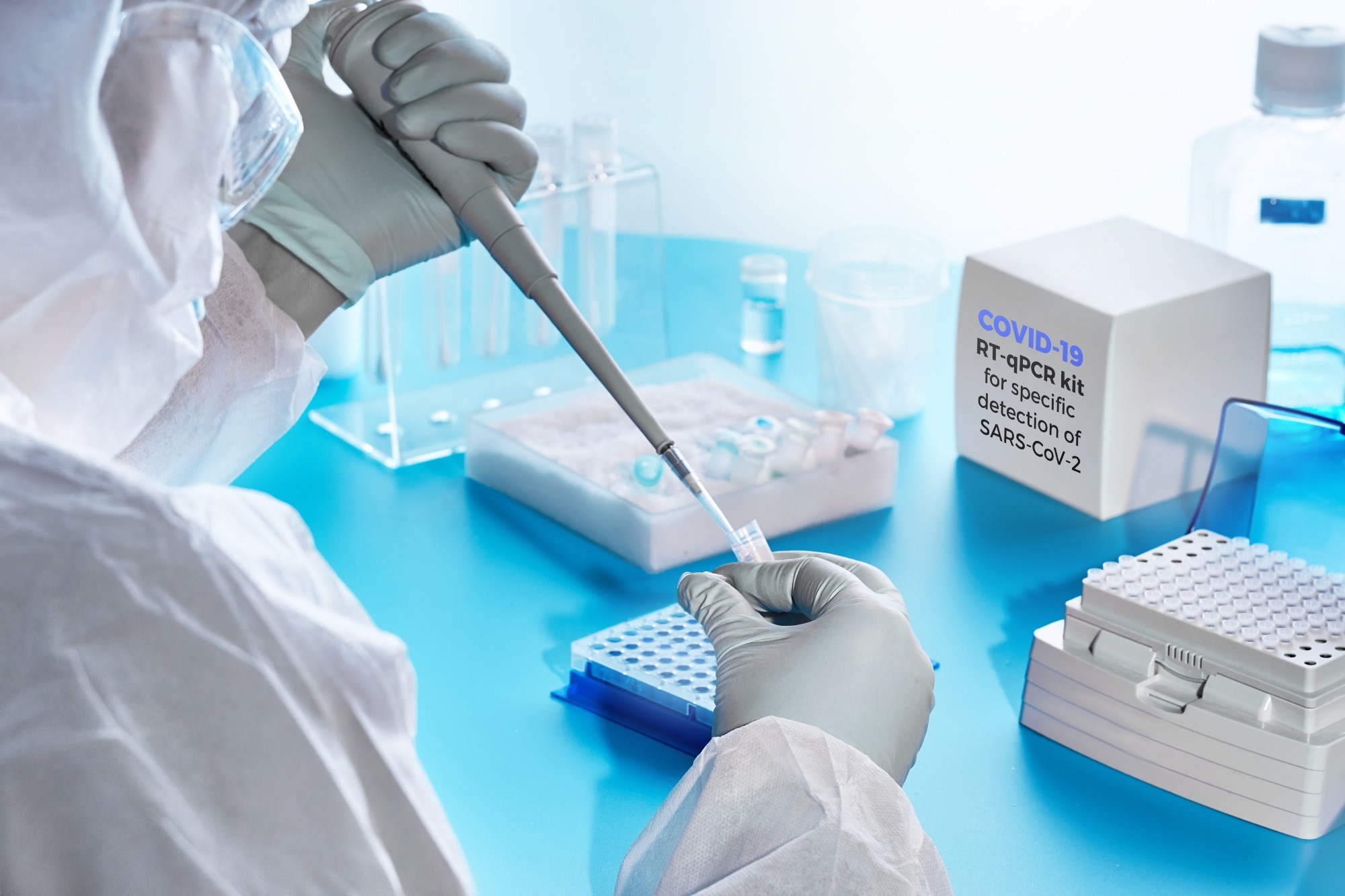Accurate and rapid diagnosis of severe acute respiratory syndrome coronavirus 2 (SARS-CoV-2) infection has been instrumental in mitigating viral spread during the coronavirus disease 2019 (COVID-19) pandemic. One of the first diagnostic tools developed was the reverse transcriptase-polymerase chain reaction (RT-PCR) tests for detecting SARS-CoV-2. The emergence of SARS-CoV-2 variants of concern (VOC) has adversely affected testing performance.
 Study: Evaluation of a Commercially Available Rapid RT-PCR Assay’s Detection of SARS-CoV-2 Novel Variants. Image Credit: tilialucida/Shutterstock
Study: Evaluation of a Commercially Available Rapid RT-PCR Assay’s Detection of SARS-CoV-2 Novel Variants. Image Credit: tilialucida/Shutterstock

 *Important notice: medRxiv publishes preliminary scientific reports that are not peer-reviewed and, therefore, should not be regarded as conclusive, guide clinical practice/health-related behavior, or treated as established information.
*Important notice: medRxiv publishes preliminary scientific reports that are not peer-reviewed and, therefore, should not be regarded as conclusive, guide clinical practice/health-related behavior, or treated as established information.
To address this issue, a new study posted on the medRxiv* preprint server assessed whether a novel assay could detect VOCs without substantial reductions in sensitivity.
Background
One of the earliest RT-PCR assays available was the Xpert® Xpress SARS-CoV-2 assay (Cepheid) for point-of-care testing. It obtained EUA status in March 2020 and was advertised to accurately detect SARS-CoV-2 within an hour by utilizing primers targeting the viral envelope (E) and nucleocapsid (N2) genes.
The Xpert® Xpress SARS-CoV-2 assay conformed with the Centers for Disease Control and Prevention (CDC) RT-PCR test and the Cobas® SARS-CoV-2 assay (Roche). It was seen to be more sensitive than the Abbott ID Now SARS-CoV-2 Assay. However, since its development, several SARS-CoV-2 VOCs have emerged, which have affected the performance of diagnostic PCR assays, owing to mutations in primer binding sites. This is problematic as it could lead to false negative results.
Amplification of the S-gene target in variant samples (S-gene failure) and reduced sensitivity have been observed in tests for SARS-CoV-2. However, the Xpert® Xpress and other assays that target other genes could detect variants with S-gene mutations. The drawback of the Xpert® Xpress assay is that many single nucleotide polymorphisms (SNPs) within the nucleocapsid gene could cause N2-gene target failure.
About the study
Using results from a clinically certified RT-PCR assay as a benchmark, the current study evaluated the ability of Xpert® Xpress SARS-CoV-2 assay to detect VOCs, without reporting a significant reduction in sensitivity. The TE (Tris EDTA) buffer was used to store the VOC samples (N=46). The validity of the TE buffer as a storage medium was assessed before testing the samples.
The samples were collected in Seattle between March 2021 and December 2021. All VOC samples were determined positive for SARS-CoV-2 by the Brotman Baty Institute’s (BBI) Advanced Technology Lab (BATLab). They were then sequenced using the Illumina COVIDSeq Kit. The last step was the identification of the variants using the Pangolin Web App.
Five Beta (B.1.351), 4 Delta (B.1.167.2), 29 Alpha (B.1.1.7), and 7 Gamma (P.1) samples were tested with Xpert® Xpress. Additionally, 6 Omicron (B.1.1.529) samples were tested with the Xpert® Xpress SARS-CoV2/Flu/RSV assay. The latter was done due to inventory availability at the time of testing. The results were compared to positive controls stored in a standard viral transport medium (VTM).
Findings
A key current finding is that the VOC samples stored in low TE buffer are concordant with VTM. This method of storage did not diminish the sensitivity of rapid molecular assays.
The novel SARS-CoV-2 variants have augmented the speed of the spread of COVID-19 through different mechanisms, including avoiding detection by RT-PCR. As an example, the Omicron variant has a large number of S-gene mutations, which leads to significant S-gene target failure. The current study showed that Xpert® Xpress could precisely detect SARS-CoV-2 variants despite a large number of mutations in the viral genome.
The authors highlighted the possibility that other molecular assays that do not target the S-gene could also potentially accurately identify the SARS-CoV-2 variants tested in this study, including Omicron and its subvariants. However, since the B.1.1.529 variant was the only dominantly circulating variant at the time of conducting this study, it was the only one that could be tested.
The N2 gene was detected with cycle threshold (Ct) values lower than 34.6. The Xpert® Xpress did not report any appreciable N2-gene target failure. In the future, additional testing of the Xpert® Xpress SARS-CoV-2 is needed, specifically in the case of VOCs with numerous E or N2 gene mutations.
Conclusion
Rapid RT-PCR testing is extremely important in identifying and isolating infected individuals quickly. This is particularly true for newly emerging VOCs, which could be multiple times more transmissible. The current study demonstrated good diagnostic accuracy of Xpert® Xpress, compared to a clinically certified RT-PCR assay.

 *Important notice: medRxiv publishes preliminary scientific reports that are not peer-reviewed and, therefore, should not be regarded as conclusive, guide clinical practice/health-related behavior, or treated as established information.
*Important notice: medRxiv publishes preliminary scientific reports that are not peer-reviewed and, therefore, should not be regarded as conclusive, guide clinical practice/health-related behavior, or treated as established information.